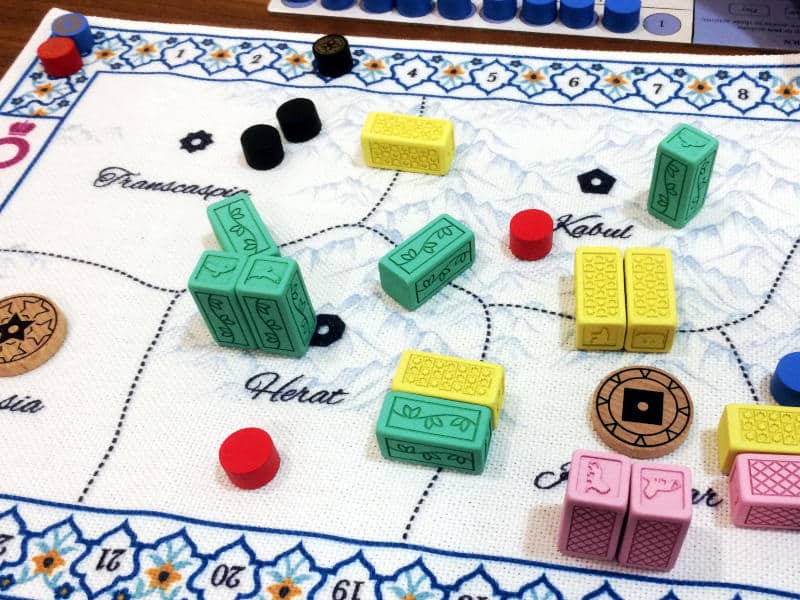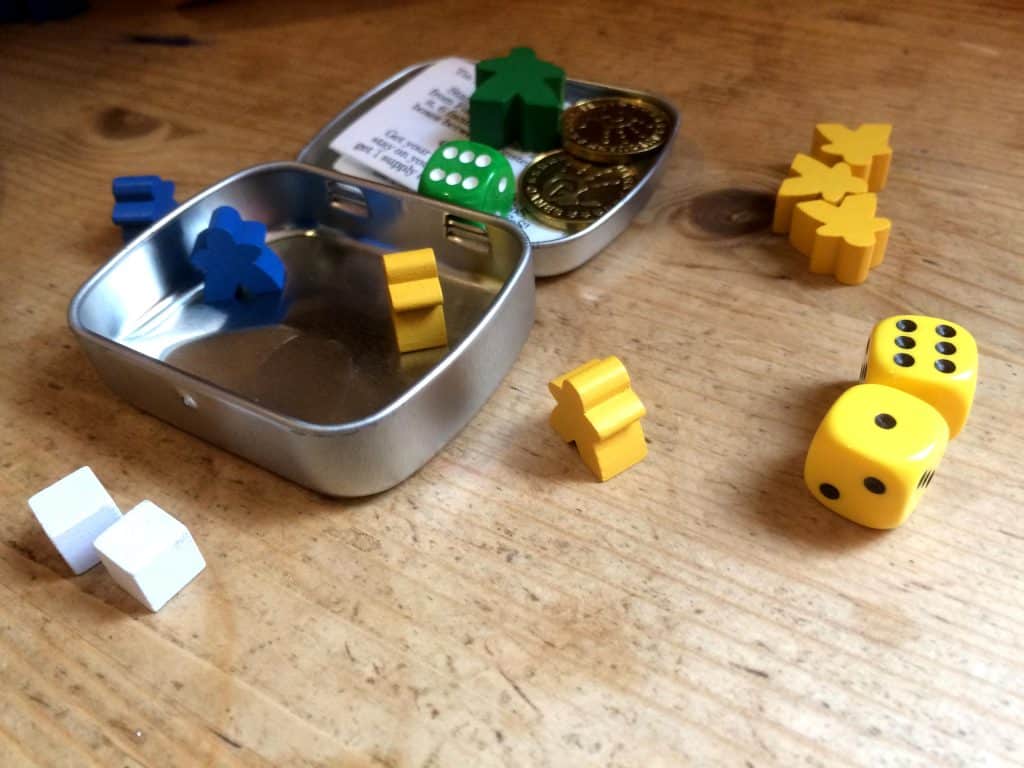If you have ever managed to get a game to the table more than once, you may have experienced how it can feel different each time. The very first game can evoke emotions that starkly contrast with playing it for the fifth time. Games can become more exciting or interesting with every play, or they can become more and more boring. It’s not necessarily a linear experience either. The same game can go from being a confusing morass and too overwhelming to comprehend to a highly engrossing battle of wits until eventually turning into a repetitive wilderness of tediousness. Of course, some games provide an almost level gameplay experience with every play. They simply keep on delighting everyone around the table, even after many plays.
I must say, it’s rare that I play a game more than four or five times. However, over the years, some games have made it back to the table regularly. I also try and complete a very loose 10×10 challenge every year. So between the evergreen games in my collection and those that have made it to the table at least ten times in one of the last few years, I think I have a fair amount of experience I can draw on for this article.
Evergreens
Let’s start with games that are fun right out of the starting blocks and that continue to be enjoyable every time you play them. These games fall within the evergreen category. They are the ones where you continue to rack up more and more plays as the months and years pass. A lot of these games are quite easy to learn and probably don’t take too long to set up. They keep players entertained throughout and don’t outstay their welcome. Therefore, game length isn’t necessarily important, because these games will make time fly.
I’m thinking about games such as Quacks of Quedlinburg or Tapestry. Neither is particularly difficult to learn. While the former is probably a lot quicker than the latter, both keep you captivated for the duration. I suppose Tapestry can feel a bit confusing to start with. However, ultimately I think the gameplay experience is pretty much the same in every game. Even if the second game can feel a little easier than the first. Neither game offers much in the way of getting better at them. They both have a fair amount of randomness, which makes forming an overall strategy quite hard. Both games are more tactical, because you respond to what’s happening on your turn and can’t plan ahead too much.
I do love both games, for different reasons, and I don’t think I’ll ever sell either of them. They are the sort of games where I know what the gameplay experience will be like before I even open the box. They are reliable games in that sense. So when nobody is really sure what they want to play, these stalwarts of predictability make the decision much easier.
Growers
There is another group of games that I would argue are evergreens, provided you allow them to mature and breathe like a good wine. They are usually quite hard to learn and take a long time to play. You spend at least one game trying to grasp the rules. The second game helps you firm everything up. Then, during your third game, you really feel you have agency and your decisions start to have the intended effect.
Once you’ve broken through this barrier of rules complexity and the overwhelming amount of choices, you start to really love the game. In fact, every time you play it, it gets better as you delve into its depths. You formulate strategies and as a group, you learn how to master this masterpiece of an amalgamation of mechanisms and rules. You go from not being worthy until eventually, you fully embrace the Dark Side and become a fearsome lord.
Oath is one of these evergreens for me that had a barrier to entry that was taller than the Wall that keeps out the White Walkers. It took us two games to get a good handle on the rules. During the third time, we had most of the rules right. We were starting to see the huge potential of what is more of a story-telling game than anything else. I have loved Oath ever since, but it’s not easy to get to the table. Yet, every game feels more and more exciting and every time is different.
I haven’t really played Pax Pamir: Second Edition enough yet, but it’s another game that took a little while to learn before it started to really shine. It wasn’t quite as bad as Oath though and it’s been getting better with every game since.

What Goes Up…
Of course, there are also games that have a meteoric rise, but after reaching their peak, they just get worse and worse. They just become repetitive and boring, or they have some major flaws. The first time you play these types of games though, you have no idea what’s hiding in the shadows. You’re drawn in by a theme, a set of mechanisms, the artwork or maybe you just fell for the hype surrounding a multi-million dollar crowdfunding campaign.
Either way, you are very excited and the first two or three games are amazing. Not only that, it just seems to get better and better. You love how it all works, you gawp at the artwork and your brain thanks you for the workout. It all meshes perfectly and you think you’re onto a winner. Then, suddenly, you read a forum post about a flaw that, when exploited, will guarantee victory, or maybe you just get to a point where you know every card and tried every strategy. There is simply nothing else the game can offer you. It just gets more and more boring.
I don’t believe in naming and shaming any games in this category, but I’m sure you’ll find one or two examples if you go through the reviews on this blog. I’ve certainly come across one that had a single winning strategy, which was impossible to prevent and was more about who managed to do a certain action first. The game started out being so promising. The theme had been fascinating me at the time and the mechanisms all sounded great. The feeling the game evoked as you played it was also wonderful and very fitting for its setting. However, once the flaw was discovered, the game left my collection.
Gameplay Experience Down the Pan
The final category is games that basically go downhill from the start. Now, I don’t mean games that have a badly written rulebook or those that you don’t get on with for other reasons straight away. I’m talking about games that seem to have an appeal and that make you want to play them. The first game might even be good and very enjoyable, but subsequent plays make you feel differently.
Often, these games are those that become repetitive very quickly or where you just don’t feel you have much agency. Maybe there is too much luck involved that just isn’t any fun. Maybe the game seemed to promise more than it delivered. There might be lots of interesting mechanisms, but then it turns out that you basically just need to do one thing to win. That’s like the flaws I was talking about before, but instead of coming across it by chance, it becomes clear while playing your first or second game.
Again, I don’t want to name and shame any games here, but look through my reviews and you probably find examples. There have certainly been games that I had high hopes for when I read the rulebook or the game description. However, when I played these games, there really was not much there to keep me interested.

Light Games Aren’t Bad Games
Don’t get me wrong. I don’t mind light games or games with a lot of luck. I really enjoy something like Mint Tin Mini Skulduggery, where you roll dice and have only limited decisions to make. It’s a really fun, quick game that fits in your pocket and can be played virtually anywhere. However, the crucial thing is, it doesn’t promise more than it delivers. It’s an evergreen game for me where I know what to expect.
Yet, when a game seems to offer lots of possibilities and choices, but then it turns out that most of the choices are not really conducive to winning, it makes for a disappointing game. Similarly, if a game promises a lot of excitement and then is simply uninteresting, it’ll quickly go downhill, straight from the start.
What About You?
So what about you? What sort of games can you think of for these different types I talked about? What game was hard to learn, but got better all the time? What game is your go-to game that offers a predictable experience? As always, I’d love to hear from you. So leave your comments below and share your thoughts with us.
Useful Links
- Quacks of Quedlinburg review: https://tabletopgamesblog.
com/ 2020/ 06/ 06/ the-quacks-of-quedlinburg-saturday-review/ - Tapestry review: https://tabletopgamesblog.
com/ 2019/ 11/ 09/ tapestry-saturday-review/ - Oath review: https://tabletopgamesblog.
com/ 2021/ 11/ 27/ oath-chronicles-of-empire-and-exile-saturday-review/ - Pax Pamir: Second Edition review: https://tabletopgamesblog.
com/ 2022/ 08/ 27/ pax-pamir-second-edition-saturday-review/ - Mint Tin Mini Skulduggery review: https://tabletopgamesblog.
com/ 2019/ 03/ 09/ mint-tin-mini-skulduggery/
Audio Version
Intro Music: Bomber (Sting) by Riot (https://www.
The following music was used for this media project:
Music: Lofi Chill Hip-Hop by WinnieTheMoog
Free download: https://filmmusic.io/song/6347-lofi-chill-hip-hop
License (CC BY 4.0): https://filmmusic.io/standard-license
Artist website: https://linktr.ee/taigasoundprod
The following music was used for this media project:
Music: Lofi by DreamHeaven
Free download: https://filmmusic.io/song/6148-lofi
License (CC BY 4.0): https://filmmusic.io/standard-license
Artist website: https://www.patreon.com/dreamheaven

